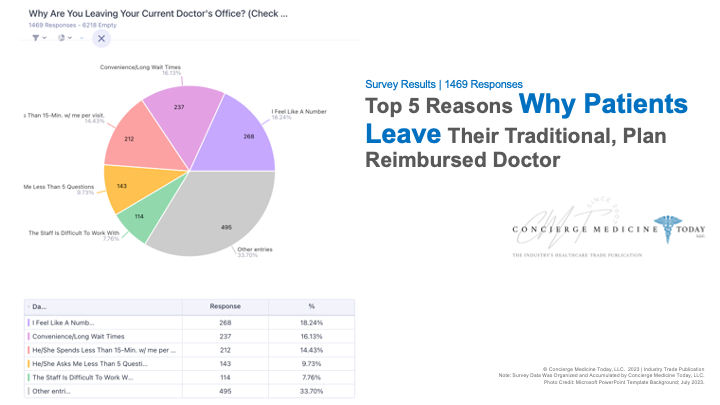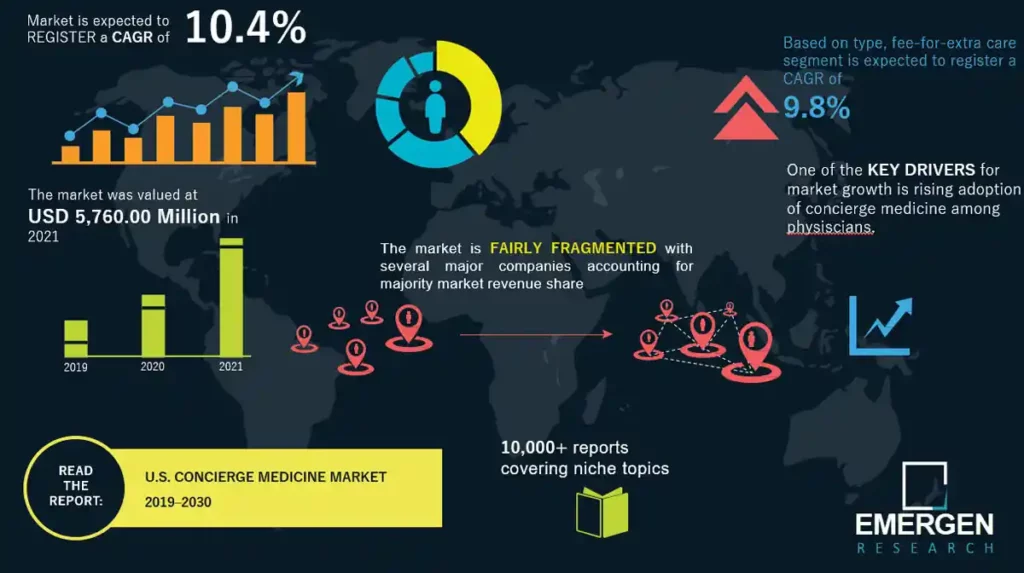Navigating the current healthcare landscape often means enduring rushed appointments and impersonal interactions, leaving many to feel like just another number in an overstretched system.
The frustrations stemming from traditional medicine’s limitations drive patients and providers to seek better alternatives.
Enter concierge medicine—a model that not only addresses these pain points but revolutionizes the approach to personalized healthcare.
Ready to explore how this game-changing model of care is setting new benchmarks for healthcare excellence?
In this blog post, we’ll dive deep into the benefits of concierge medicine, showcasing how it redefines the essence of patient care. We’ll also cover some of the main challenges in this field and provide tips on choosing a concierge medicine provider.

Benefits of Concierge Medicine
As the landscape of healthcare shifts toward more personalized solutions, concierge medicine is becoming a preferred choice for those seeking superior patient experience.
But what exactly makes this model stand out?
Let’s unpack the benefits of partnering with a concierge doctor:
1. Customizability and Personalization
At the heart of concierge medicine lies a commitment to personalized care. This approach not only transforms how care is delivered but also enhances the overall patient experience.
For example, concierge personalized medicine provides treatment plans and health strategies that are extensively customized based on your unique health profile and personal goals.
This model also offers more flexible scheduling options, including increased appointment availability. This means your concierge doctor can meet you where you are—whether at home or in the office—eliminating the stress and time lost in transit to traditional doctor’s offices.
2. Accessibility
One of the most transformative benefits of concierge medicine for patients is its unparalleled access to healthcare providers.
Whether it’s a sudden onset of symptoms or questions about a persistent health issue, concierge patients enjoy 24/7 direct access to their healthcare team through concierge emergency medicine. This means:
- Immediate access ensures that help is just a call or text away, anytime, eliminating the wait for responses or appointments.
- Even subtle or complex symptoms can be evaluated quickly, avoiding the delays that often occur in standard medical care.
- You get access not only to routine check-ups but also to immediate consultations whenever necessary. Concierge practice specialties go beyond just primary care.
3. Stronger Patient-Physician Relationship
Concierge medicine is all about building deep, lasting relationships between patients and physicians.
It also makes it easier for patients to get in touch with their doctors and encourages them to stick closely to preventive care plans. For example, did you know that patients with a dedicated primary care provider experience a 19% lower risk of premature death compared to those who only see specialists sporadically?
This commitment to personal connection also allows concierge doctors to focus more on patient care than paperwork, significantly enhancing the quality of healthcare.
4. Comprehensive Healthcare
Equipped with advanced lab and diagnostic tools, including EKGs, X-rays, and dedicated in-house laboratories, concierge medicine ensures that all necessary diagnostic testing is readily accessible and exceptionally efficient. This enables concierge doctors to swiftly obtain the information needed and craft the most effective care plans.
Additionally, doctors in this model are not pressed by time constraints typical of traditional practices, allowing them to delve into a patient’s medical history, lifestyle, and individual circumstances. This in-depth understanding fosters a holistic view of health, where treatment plans encompass not just immediate symptoms but overall well-being.
Advantageous Growth of Concierge Medicine
The concierge medicine trends illustrate a robust growth pattern that signifies a fundamental shift in healthcare delivery.
For example:
- As of 2023, the market was valued at an impressive $21.1 billion.
- Projections estimate a rise to $38.9 billion by 2032, achieving a steady CAGR of 7.1%.
- There are currently between 5,000 and 7,000 concierge medicine programs and physicians across the United States.
This growth is fueled by a variety of factors, including:
- An aging population of doctors seeking sustainable practice models
- Younger physicians desiring to avoid the burnout prevalent in traditional settings
- The evolving expectations of healthcare consumers, who are increasingly prioritizing accessibility, personalized care, and comprehensive service offerings
These trends suggest that the model will continue attracting both providers and patients, looking for more meaningful healthcare interactions and a departure from the inefficiencies of conventional medical practices.
Additionally, the integration of advanced technologies such as AI is set to play a significant role in the future of concierge medicine. AI’s capability to streamline administrative tasks, enhance diagnostic processes, and personalize patient care aligns perfectly with the goals of concierge medicine.

Potential Drawbacks to Keep in Mind
While concierge medicine has numerous advantages, it’s important to consider some potential drawbacks before making the switch. Here are some of the main problems with concierge medicine:
- Higher costs: Concierge medicine typically requires a membership fee ranging from $2,000 to $50,000 per year, which may be prohibitive for some individuals. This fee ensures personalized care and greater access but does represent a significant investment.
- Concierge medicine and insurance: Concierge practices often provide services not covered by traditional insurance. Patients must navigate what their insurance will and won’t cover, which can complicate managing healthcare expenses. Moreover, not all concierge practices accept every type of insurance, which might limit patient options.
- Shortage of qualified concierge care: Despite the growing popularity, finding a concierge doctor can be challenging, especially in less populated areas. Many practices also limit their patient load to maintain high-quality personalized care, which can lead to long wait times for new patient slots.
- Complex integration with primary care: Concierge medicine and direct primary care are different. Integrating concierge services with the broader healthcare system, including primary care and specialist services covered under traditional insurance plans, can sometimes be cumbersome. Patients and providers must coordinate across different systems to ensure comprehensive care.
How to Choose the Right Concierge Medical Provider?
Selecting the right concierge medical provider is crucial to ensuring you receive the full array of benefits while mitigating potential drawbacks. Here are some essential factors to consider:
- Get recommendations: Personal referrals from trusted sources, such as family, friends, and your primary care doctor, can guide you to reputable concierge services known for quality care.
- Check credentials and experience: Ensure the concierge doctor is board-certified and has extensive experience in concierge medicine. Experienced physicians are more likely to deliver successful outcomes and handle various medical conditions.
- Consider accessibility and convenience: Choose a provider located conveniently near your home or workplace and offers 24/7 availability. This ensures that you can easily access care whenever necessary without significant disruption to your daily routine.
- Evaluate communication and care approach: A good concierge service should offer direct communication channels like telehealth, allowing continuous interaction between doctor visits.
- Read patient reviews: Look at online reviews to gauge patient satisfaction with the doctor’s care and the practice’s operation. Patient testimonials can provide insights into the practice’s environment and the effectiveness of the care provided.
Conclusion
Concierge medicine reshapes healthcare with a personal touch, offering significant advantages over traditional models.
As a premier concierge medicine provider, WorldClinic stands at the forefront of this evolution, offering a level of care that distinctly surpasses traditional models. Premium concierge medicine practices like ours typically boast a remarkable 80:1 member-to-physician ratio, far superior to the typical 450:1 ratio seen in standard concierge practices and the overwhelming 2500:1 ratio in non-concierge settings.
Unique to WorldClinic is our board-certified, physician-led telemedicine, which elevates 24/7 availability, providing critical, real-time medical responses. This is especially beneficial for travelers, senior patients, and busy executives who seek swift and effective medical attention. Our executive concierge medicine options are specifically tailored to adapt to demanding schedules while maintaining privacy and efficiency.
Additionally, if you are seeking concierge family medicine, individual, or employer plans, our flexible options ensure that your healthcare is as unique as you are.
Explore the possibilities with WorldClinic and experience concierge medicine tailored just for you. Contact us today to learn more about our services and how we can help you achieve optimal health and well-being.
Frequently Asked Questions
1. Are the Benefits of Concierge Medicine Worth the Cost?
While concierge medicine does come with a membership fee, personalized care, reduced waiting times, and 24/7 access to healthcare providers offer significant value. These benefits lead to better health management and can decrease overall healthcare expenses in the long run by focusing on prevention and early intervention.
2. How do Concierge Medicine Benefits Improve Patient Outcomes?
Concierge medicine enhances patient outcomes by facilitating more frequent and in-depth communication between patients and their doctors. This ongoing interaction allows for tailored health strategies, immediate adjustments to treatment plans, and catching potential health issues early on.
3. Are all the Benefits of Concierge Medicine included in the Membership Fee?
The concierge medicine membership fee covers most primary care services, including unlimited visits and direct access to your physician.
However, specialized services and treatments outside the standard scope may incur additional costs. It’s essential to discuss with your provider what is included to understand the full scope of your coverage.
4. Can Patients Customize Concierge Medicine Membership Benefits?
Yes, many concierge medicine practices offer customizable membership plans. This flexibility allows patients to choose services that best fit their health needs and lifestyle, ensuring they receive the most relevant and effective care.
Customization can include the addition of wellness programs, specialized testing, and more personalized care options.


